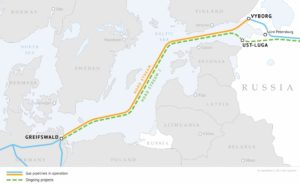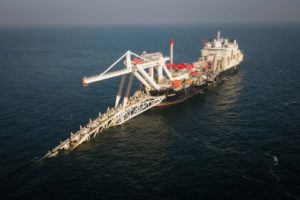The United States recently imposed heavy sanctions against those companies currently involved in the construction of the Nord Stream II pipeline, once again highlighting the important role of Natural Gas in influencing the international political agenda.
The Nord Stream II pipeline, with an annual capacity of 55 billion cubic meters, will join Nord Stream I under the Baltic sea, transporting natural gas from Russia to Germany. Expected to be running by the beginning of 2020 the pipeline will increase the amount of Gas currently running under the Baltic sea to 110 billion cubic meters, almost double the current amount. It was established with the goal of giving Europe a more sustainable gas supply and Russia better access to European Gas Markets.

Nevertheless, despite its seemingly mutual gains, the pipeline has been subjected to significant criticism and is considered highly controversial.
Most prominently, Questions have been raised with regard German dependence on Russian natural gas. Germany depends heavily on imported oil and gas for its economy and its low production of such resources has made it reliant on imports for 92% of its gas supply. An increase of such supply through Nord Stream II has therefore been met with significant concern for Germany’s future dependence on Russian energy which could make it susceptible to exploitation and vulnerable to interference. Spokesmen of the US government have argued that “Russian Gas has Strings attached” and several resolutions have been passed by the EU and the US congress calling for an end to the pipeline’s construction. They consider German dependence on Russian resources to be a threat to the common European Market.
A further concern has emerged regarding the possibility of Russia bypassing the current Polish and Ukrainian gas pipelines to Europe by exclusively providing its gas through the Nord Stream pipelines. Ukraine has historically been the gatekeeper of Russian gas, with over 40% of all gas destined to the EU passing within its borders. Historically, this position has given Ukraine significant Geopolitical leverage which could now become obsolete once Nord Stream II is completed and the country’s pipelines are no longer essential to reach the Russian export market. In fact, once the pipeline is built, Russia will have a non-Ukrainian transit capacity of 205.9 Billion cubic meters per year available for its exports to Europe. Many therefore fear that Russia is deliberately attempting to weaken Ukraine through the construction of the Nord Stream II pipeline.
Consequentially, the construction of Nord Stream II and its potential as a tool for the engineering of German compliance and the weakening of the Ukrainian state has significantly underpinned the importance of natural gas to the field of international politics.
This ability of Natural Gas to emerge as a security concern can be attributed to the qualities of the resource itself. The Nature of natural gas as a low-density substance presents special challenges for its transportation. Because of its volume, it is not easily stored or moved by vehicle. For transportation across land, natural gas is usually moved through a network of pipelines which must maintain it in a highly pressurized state. This is achieved through the presence of multiple compressor stations along the route of the pipeline. Moreover, in the transportation of natural gas by land, the potential for leaks is extremely high, often resulting in a loss of gas known as “unaccounted for gas”.

The need for multiple compressor stations to keep the gas pressurized as well as the high potential for gas leakage, therefore, ensure that the transportation of natural gas in its gaseous state can only be executed over short distances. This spatial limitation for the transportation of natural gas has determined the politicization of the resource as well as the dependency of most European states on Russian for their import of natural gas due to its proximity. While other states with natural gas resources exist, these are unable to transport them to the European market due to the resources’ transport limitations.
Consequently, the nature of Natural Gas as a resource that is extremely difficult to transport across long distances has ensured its politicization and its value as a tool of foreign policy. In fact, its importance to international relations has been once again highlighted by the current political turmoil surrounding the construction of Nord Stream II.
Author: Yasmin Baldi
Bibliography
Riley, Alan. “Nordstream 2: Too many obstacles to be delivered?” (Atlantic Council, 2015). www.jstor.org/stable/resrep03448.
“Transporting Natural Gas.” (Scientific American 54, no. 26, 1886) 403. www.jstor.org/stable/26090520.
Brown, Stephen P. A., and Mine K. Yücel. “What Drives Natural Gas Prices?” (The Energy Journal 29, no. 2, 2008) 45-60. www.jstor.org/stable/41323156.
Frederick, John H. “Pipe-Line Transportation of Natural Gas.” (The Annals of the American Academy of Political and Social Science 171, 1934) 235-43. www.jstor.org/stable/1018105.
Gazprom, “Nord Stream 2” (Gazprom, 2019). https://www.gazprom.com/projects/nord-stream2/
Günther Maik, “What Nord Stream 2 means for Europe” (Atlantic Council, 2019) https://www.atlanticcouncil.org/blogs/ukrainealert/what-nord-stream-2-means-for-europe/
Keating, Dave “Trump imposes sanctions to stop Nord Stream 2 but its too late” (Forbes, 2019) https://www.forbes.com/sites/davekeating/2019/12/21/trump-imposes-sanctions-to-stop-nord-stream-2–but-its-too-late/#15bf4b95df1e
Nord Stream 2. “Construction Activities” (Nord Stream 2, 2019) https://www.nord-stream2.com/construction/construction-activities/